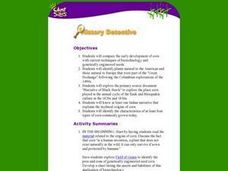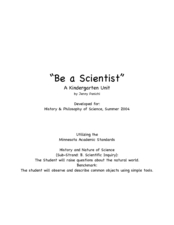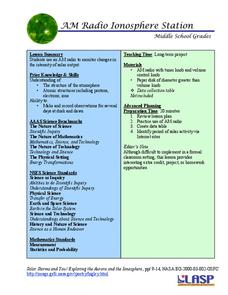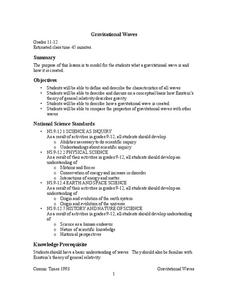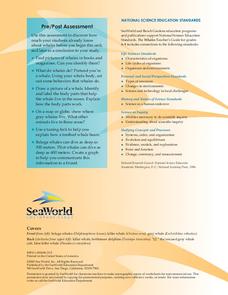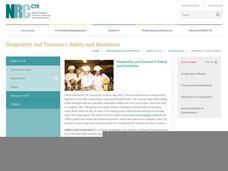Curated OER
World History: Why Civilizations Fall
Students examine factors leading to the demise of ancient civilizations. They list causes that led to the downfall of these societies. Students conduct Internet research and participate in online archaeological investigations.
Curated OER
Science Italian Style: Eruption!
Young scholars explore ways scientists prepare for a volcanic eruption. They observe films of earthquakes, oil spills, volcanoes and hurricanes. Students perform activities to demonstrate the relationship of viscosity to lava flow. ...
Curated OER
Natural Resources
Students explore Iowa geography and topographic maps. In this geography and topographic maps lesson, student investigate maps, newspapers, Iowa flora and fauna. Students gain an understanding of how different landforms can be identified...
Curated OER
History of Saturn Discoveries
Students interpret how scientists have explored Saturn. In this NASA based astronomy lesson, students create a timeline depicting the study of Saturn from 1610 until 2010. Each student will write a letter to Galileo discussing how the...
Curated OER
History Detective
Middle schoolers study the effects of the Great Exchange on the Americas.
Curated OER
The Use of Myths in Science
Learners are told stories, myths and legend to explain their world. After telling the tales and discussion them, students are assigned to write a myth that describes a familiar situation, such as why the school garbage cans are always...
Curated OER
Be a Scientist: A Kindergarten Unit
Students conduct observations using their five senses. In this science lesson, students describe different states of matter. They investigate the factors affecting mold growth.
Curated OER
History of the Periodic Table
Students sort a group of manipulatives and then explain their organizational system to the class. They discuss the work of scientists trying to organize the elements into a system that made sense and the development of the periodic table.
Curated OER
Fossil Fuels (III), The Geology of Coal: Interpreting Geologic History
Students hypothesize about why various samples of coal have different characteristics. Pupils use information that they found during Internet searches to ascertain the validity of their hypotheses and verify the "story" of coal. ...
Curated OER
Water Purification
Students use the example of natural water purification to show that healthy ecosystems provide services to people that are essential to life as we know it.
Education Outside
Papermaking
Imagine recycling food scraps and using them to make paper. The directions are all here in a seven-page packet that details several paper-making strategies.
PHET
AM Radio Ionosphere Station
Tune in! Young scientists use an AM radio at home to monitor solar output. The long-term project would be ideal in a flipped classroom or as an out-of-class project.
Theodore Roosevelt Association
Roosevelt's Legacy: Conservation
The legacy of Theodore Roosevelt carries through modern American politics, economics, foreign policy, and society. But his proudest and most profound efforts were in the world of conservation, and in preserving the natural beauty of...
NASA
Gravitational Waves
Young scientists participate in a hands-on experiment to explore Einstein's theory of relativity in a creative manner. They investigate various waves and compare their characteristics as they discuss how each wave is created....
American Museum of Natural History
Theodore Roosevelt's Outdoor Adventures
Time for a virtual sightseeing trip. Pupils explore the Grand Canyon, Devil's Tower, and Yosemite Valley in an interactive online experience. They answer questions about the organisms in each location and draw conclusions based on their...
Indian Land Tenure Foundation
Sharing Resources: The Nuts Game
The land has always provided its inhabitants with resources that allow them to survive. However, sometimes resources run scarce and sharing becomes an important task. Help little ones understand why and how people have shared resources...
University of Colorado
Are All Asteroids' Surfaces the Same Age?
Did you know scientists can tell the age of an asteroid by looking closely at its craters? This final lesson of a six-part series focuses on two asteroids, Gaspra and Ida, in order to demonstrate the concept of dating asteroids. Scholars...
Sea World
Marine Animal Husbandry and Training
Step into the role of a zoo director with several activities about animal training and running a zoo. Kids calculate the amount of food each animal needs, design a habitat for penguins, decide how to breed bottlenose dolphins, and train...
Sea World
Whales
A whale of a instructional activity is sure to intrigue your elementary oceanographers! Learn about the mammals of the sea with a series of activities about whales, dolphins, and porpoises. Kids complete worksheets about the anatomy of a...
Indian Land Tenure Foundation
Native Foods and Livelihoods
Introduce young scholars to the ways in which land and people have a relationship. They examine the types of food local tribes have traditionally consumed and ways in which the people and the land both benefited from the act of...
The New York Times
Investigating the Heroin and Prescription Opioid Epidemic
How bad is the opioid crisis in America? Has it gotten worse in the last few decades? Why? High schoolers delve into these questions with a thorough and thoughtful lesson from The New York Times on heroin prescription opioids....
National Research Center for Career and Technical Education
Hospitality and Tourism 1: Safety and Sanitation
Math and science come alive in this career-related lesson on sanitation. Along the way, learners explore bacterial growth rates using exponential notation and graphs. A link to a very brief, but vivid video shows just how quickly these...
Constitutional Rights Foundation
Putin's Illiberal Democracy
Is Russia really a democracy? High school scholars explore Russian democracy under the leadership of President Putin. The resource provides opportunity for group discussion, writing, and research to understand Russia's political history,...
Curated OER
Readings in Hudson River Natural History: Understanding Informational Text
After reading a series of informational articles regarding the Hudson River Estuary, the class will answer a series of comprehension questions. An answer key is provided but the articles and worksheets are not.






